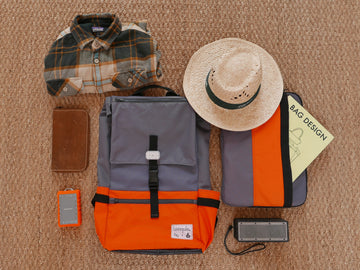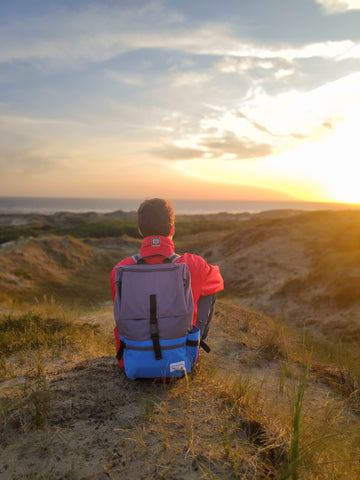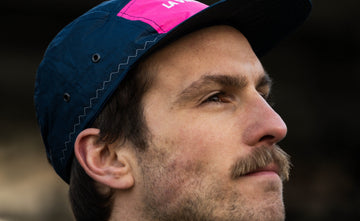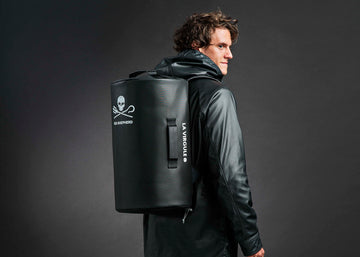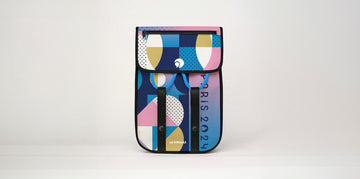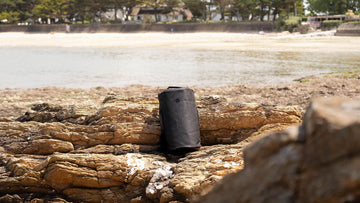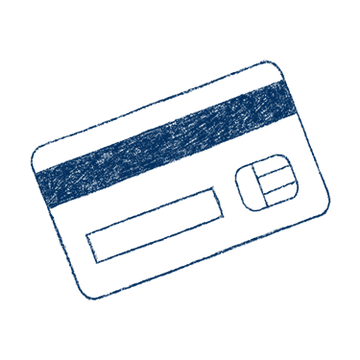January 2, 2024, I step out of the office and spot one of our first backpacks, the Granite. It came in two versions, made from end-of-life inflatable kayaks or reformed climbing mats. Its owner is wearing it particularly well, and it almost makes me want to restart production...
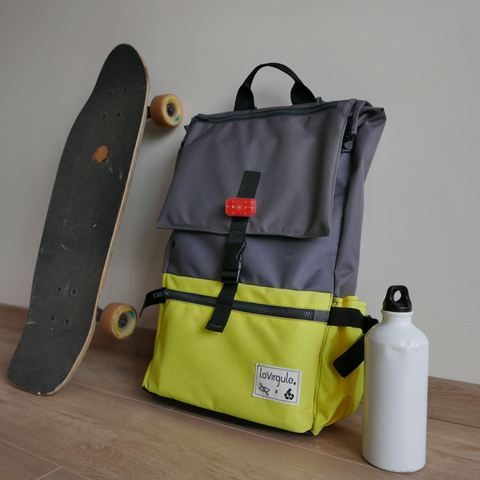
Last prototype sewn by Benoît and Maxime before production launch.
I'm reminded of the aches and pains of this bag and the headaches it caused us.
A great opportunity to finally put into words everything we learned with this first product and why we chose to stop using it.
1 - Confronting our convictions
When we started out, we were strongly inspired by brands such as Hopaal, Loom, Asphalte and La Vie est Belt. Environmental responsibility, sustainable production, brand co-construction and radical communication all appeal to us.So we wrote: To develop and distribute local luggage with a positive impact, without compromising on style or quality.

Avec un atelier couture bien dimensionné, ils sont partants mais découvrent la fabrication d’un sac à dos.
Nous imaginons alors créer avec eux un vrai partenariat, une montée en compétence progressive et simultanée pour arriver au résultat escompté, soit un sac technique et durable fabriqué à partir de matériaux upcyclés.
2 - A time of doubts
Months go by and the hoped-for quality doesn't arrive.Like any brand just starting out, we sold a project, a vision. With 150 bags pre-sold on Ulule in July 2019, we feel that on our scale we have succeeded in our gamble, with an interesting positioning and products that appeal.

Our communication has obviously focused on the recycling of waste, but also on the sustainability of our products. The latter is struggling to keep up.
In fact, we ask too much of the workshop, which can't do everything at once.
The seamstresses are trained to do less demanding sewing, the machines are not adapted and there is a lack of investment to make up for these shortcomings.
However, the sewing workshop manager puts all her energy and patience into it. She often works miracles, but our brand cannot rely on the skills of just one person.
3 - Making choices
Our doubts were confirmed, and the first customer emails arrived. The main fault is the loose shoulder strap...From a technical point of view, this makes sense, as it's the area with the greatest sewing thickness, and the workshop machines, thread and needles used are undersized.
This first mistake taught us a lot about customer relations and after-sales service, but it also cost us dearly. Between the cost of repatriating the products, the repair time and the return shipment, the margin on our products has soared.
Fortunately, our customers are wonderful, believe in us and are always sympathetic and patient.
To be relevant to the problem we want to solve with La Virgule, our products have to be consistent across the board. We have to work with each company and its people for what they do best. Our battle is to make the outdoors circular, and we're doing this by repurposing raw materials into technical bags.
4 - Resize our supply
Our ambition is and always has been to industrialize upcycling, to make the world of sports and outdoor wear circular.
We know perfectly well that we'll have an impact by recycling as many materials as possible, and therefore by being able to produce and deliver products that are technical, desirable and, above all, of a quality that surpasses that of a conventional product.
2020, time for containment. The whole team is dispatched left and right, and we take the opportunity to step back and capitalize on our early experience.
We develop our new 35-liter Duffel Bag. This time, we know we have no room for error: quality must be beyond reproach. If our first bag was our soft skills, the pledge of our values, the next must be that of our 'savoir-faire'.
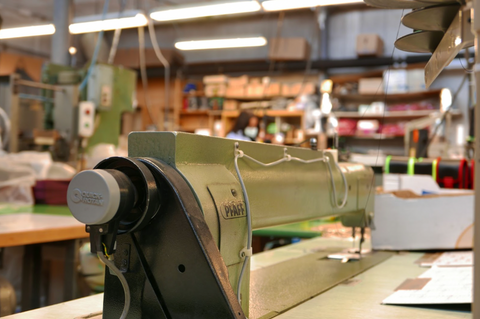
We chose to entrust the task to an expert workshop in technical luggage, a benchmark in Europe. We found this workshop in Portugal, south of Porto. A family-run workshop that has since become our first production partner, with insane quality. Since then, we've received rave reviews from our customers, and our ability to accelerate our impact has been multiplied. Admittedly, our raw materials travel more kilometers than before, but this is more than offset by the lifespan of the end product and its quality (impact study underway).
5 - A boost to local production, a strong impact
Although the gamble on technical backpacks made just a few kilometers from home didn't pay off, our partnerships with local workshops have not ceased - quite the contrary.
Raw materials are prepared in Tourcoing, Marcq-en-Baroeul and Calais in ESATs and social integration workshops, with hundreds of hours of work each year.
Our bike covers, fanny packs and other accessories are still made in Lille and Calais, and are of the highest quality! The big difference compared with backpacks is that these products are consistent with the know-how and tools available in these workshops. We can't thank them enough for the value they bring us.
Now you know more about our adventure, our beginnings and our setbacks, which we're always ready to share with you in complete transparency. All our decisions are based on a simple equation, which we'll share with you below:
La Virgule = (Best product for our customers)*(Lowest environmental impact)*(Workshops that respect people)
But since this isn't a real equation, we can simplify it by saying that from A to Z, we give our best every day.
Benoit Gourlet - CTO - Surfer, backpacker, beekeeper.



